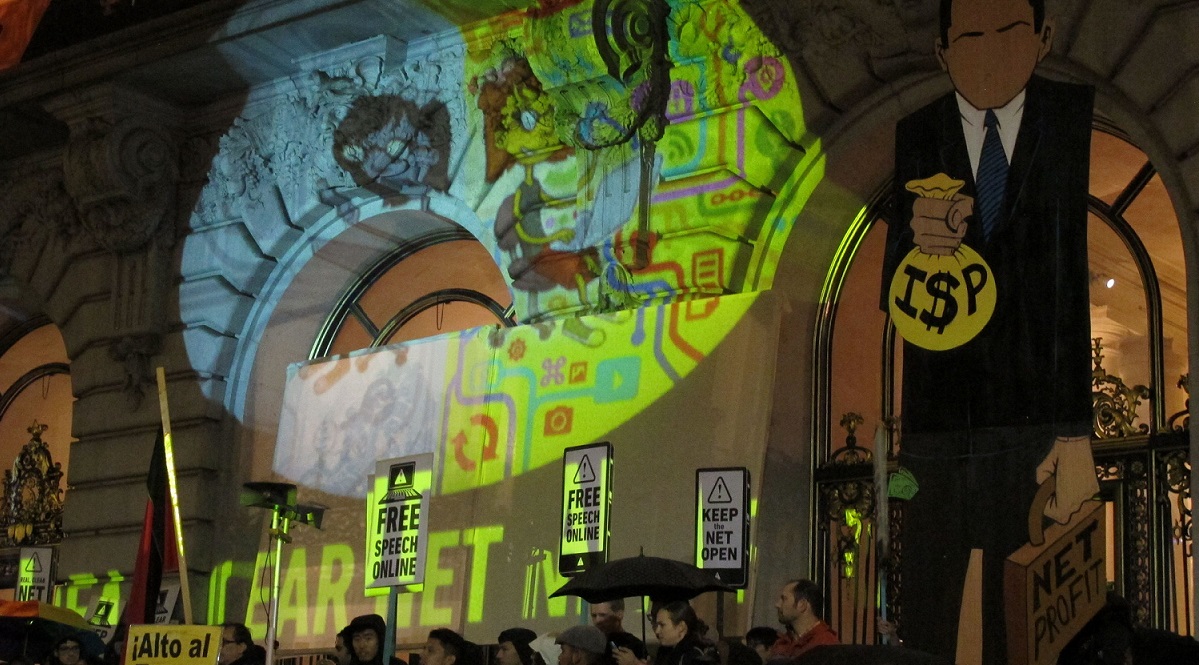2017 was a rollercoaster for internet advocates worldwide, filled with both exciting, hard-won victories and devastating decisions that will have ramifications as we come into the new year. Let’s look back into three key milestones in the digital rights realm from 2017 to better understand the challenges and battles that lie ahead in 2018 — and how netizens can be part of the momentum.
April 2017: The CRTC ruled against zero-rating, the practice in which Big Telecom can select certain apps and services that don’t count against your data cap — dictating your online experience for you and privileging those with big pockets who can strike backroom deals to make their services data exempt and more accessible. Zero-rating violates net neutrality, the principle that all content on the internet should be treated equally — preventing ISPs from engaging in trickery such as throttling, blocking or paid-prioritization of sites and services.
What’s next?
After the FCC voted to repeal Net Neutrality in the U.S. in December, it became clearer than ever that this decision would be immediately felt north of the border (and worldwide) and could easily jeopardize Canada’s own net neutrality rules — especially with the upcoming Telecommunications Act review. Rather than relying on case-by-case decisions that side with net neutrality protections, this year we’ll have to fight for the federal government to enshrine net neutrality in our federal law.
June 2017: Bill C-59 was announced, with some big improvements to the reckless, dangerous and ineffective Bill C-51 that Canadians had long fought against. Some of the big improvements included a new pan-government review body for our spy agencies and a narrower definition of “terrorist propaganda” — so that this term no longer encompasses activities like peaceful protest and artistic expression.
However, Bill C-59 fell short of addressing some of the most troubling aspects of Bill C-51, such as extensive information-sharing provisions between government agencies. It also makes no mention of protecting our right to encryption — a vital aspect of our security — nor protecting us from mass surveillance devices like Stingrays, which were found to be used by the RCMP illegally in the past. Generally speaking, Bill C-59 is far from the repeal of Bill C-51 which thousands of Canadians have been relentlessly fighting over the past few years.
What’s next?
A Parliamentary committee is currently discussing reforms to the national security legislation, so this is our chance to make significant improvements to C-59 and hopefully get rid of some of the most terrible aspects of its predecessor. At OpenMedia, we’ll be turning our attention to the SECU committee to demand robust privacy protections. Canadians can submit their personalized letters here, and we’ll include them in our witness statement. We’ll be testifying on February 8.
November 2017: The European Parliament civil liberties committee voted against core dangerous proposals for content filtering a.k.a. censorship machines (Article 13 in the European Commission’s copyright draft proposal) — a move which would have had seriously detrimental consequences for online freedom of expression and innovation for all internet users, not just in the EU. This has been one of OpenMedia’s longest and hardest fought campaigns, rallying over 135,000 people to speak up against censorship machines and the Link Tax as part of the Save The Link campaign.
What’s next?
The controversial Link Tax — a proposal which seeks to charge news aggregators for displaying the snippets of text that usually accompany links in search results, is still on the table. But one more critical vote in January could axe it. So we’ll be following the issue closely and in the meantime, people can contact their MP and urge them to completely sweep censorship machines and the Link Tax off the table at: https://act1.openmedia.org/savethelink
Stay tuned with OpenMedia‘s latest updates on Facebook and Twitter.
Marie Aspiazu is a Campaigner and Social Media Specialist for OpenMedia, a non-profit organization that works to keep the internet open, affordable, and surveillance-free.
Photo: Dave Maass/flickr
Like this article? rabble is reader-supported journalism. Chip in to keep stories like these coming.




